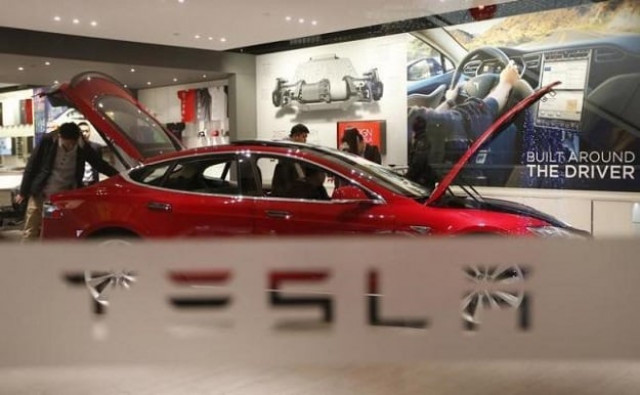Tesla says self-driving hardware to be built into all its cars
The company said that its Model S and Model X electric cars are already being produced with the new hardware

Tesla Motors' Model S P85 at its showroom in Beijing. PHOTO: REUTERS
The company said that its Model S and Model X electric cars are already being produced with the new hardware, which includes eight cameras, 12 updated sensors, and radar with faster processing. The new hardware package will cost $8,000, Musk told reporters on a conference call. The software to enable fully autonomous operation is still being tested, he said. Musk said he expects that by the end of 2017 a Tesla would be able to drive in full autonomous mode from Los Angeles to New York "without the need for a single touch" on the wheel.
Germany says Tesla should not use 'Autopilot' in advertising
He has set ambitious deadlines for Tesla many times, only to see timetables slip. Rival automakers have said they expect to be able to field autonomous driving capability by 2019 or 2021.
Meanwhile, older Tesla vehicles without the additional cameras, sensors and upgraded processors will not be able to drive autonomously, although their Autopilot software would continue to be improved, Musk said. For a time, cars with the new hardware will have less capability to assist drivers with steering or braking than older cars running Tesla's Autopilot, Musk said. By December, he said, he expects the newer models to reach parity with the older vehicles.
Musk said the software system is being built in-house and will run on an Nvidia Corp Titan chip.
VANITY PURCHASE?
It is unclear how Tesla's future autonomous driving system will be greeted by regulators. Musk said it will be twice as safe as a human driver. However, federal and state regulators in the United States are proposing new, more rigorous standards to control the development and deployment of such systems.
Edmunds analyst Jessica Caldwell questioned the value of purchasing a self-driving car before regulations catch up, calling it a "vanity purchase" that cannot be used in the real world. In the meantime, rival carmakers could introduce better solutions, Caldwell said, potentially making Tesla's hardware "obsolete almost as soon as it's activated for prime time."
Most notably, Tesla has chosen not to include Lidar laser-based sensors, a tool most other car makers believe is necessary for full autonomy. Tesla's self-driving announcement is the latest in a series of efforts over the last few months by Musk to maintain investor interest in Tesla as its stock price has fallen. The company is expected to raise more cash from capital markets within the next 12 months. Shares of the company, which closed on Wednesday at $203.56, have fallen 23 per cent since an April high, as the company has suffered a difficult few months.
Tesla fixes security bugs after claims of Model S hack
The death in May of a Tesla driver using the company's Autopilot system, which prompted an investigation by safety regulators, and the decision to acquire money-losing rooftop solar developer SolarCity Corp, have increased scrutiny on Tesla's financial and regulatory challenges.


















COMMENTS
Comments are moderated and generally will be posted if they are on-topic and not abusive.
For more information, please see our Comments FAQ